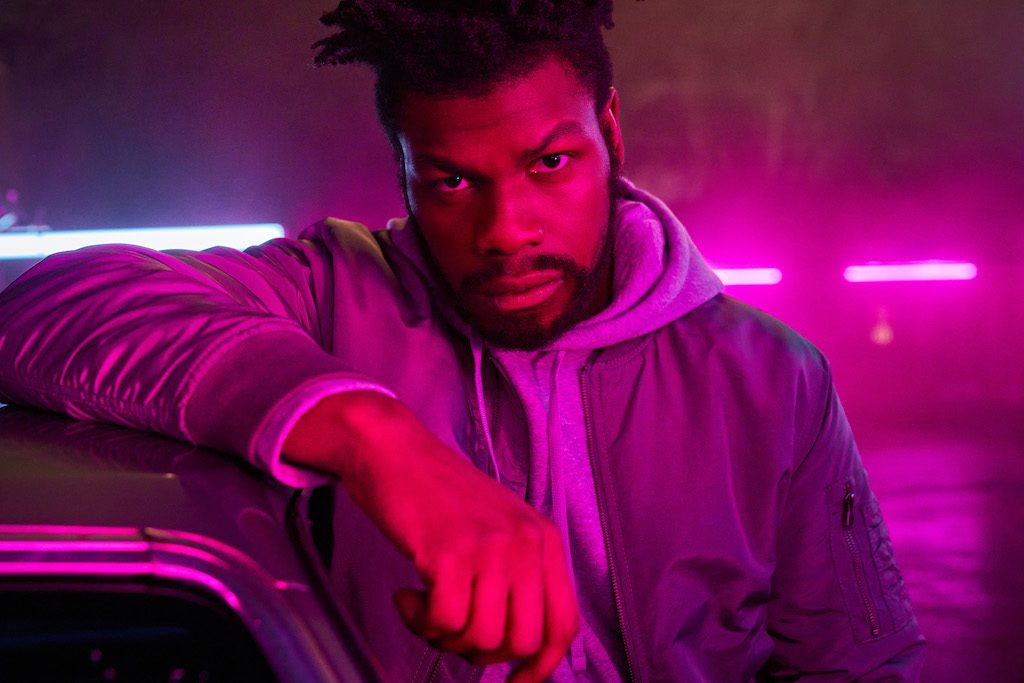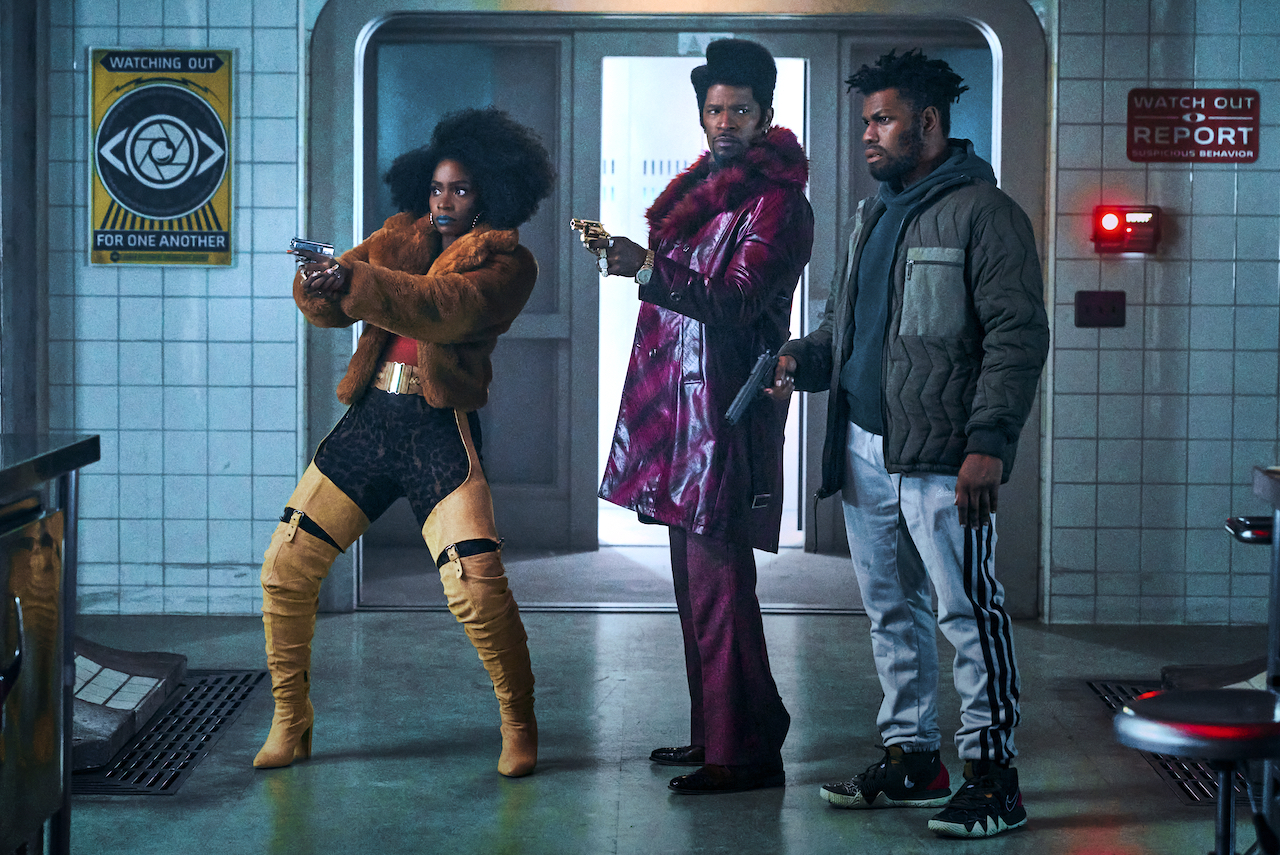“I’ve always wanted to do something in the mystery space. I love mystery movies and genre blends, and I wanted to do something with detectives who weren’t really the most suited to detecting. I had this joke in my mind for a while, ‘An entrepreneur, a pro, and a hustler walk into a bar and they end up solving a mystery. I had this juxtaposition of characters that I wanted, but I didn’t necessarily have anything more than a tone, a vibe,” recalls Juel Taylor who co-wrote They Cloned Tyrone with Tony Rettenmaier. He also directed the film. The writers compared Tyrone to Scooby-Doo minus the Scooby snacks and those pesky kids.
The real impetus for their film came from a deeply personal, troubling incident that happened to one of Taylor’s friends during college. The incident, which was completely outside his control, derailed his situation, and adversely impacted him for years to come. He became depressed and developed a blind spot to it as he tried to put his life back on track.
Five years later, the idea of a “bootleg Scobbie-Doo movie” started to take shape in Juel’s mind. The underlying theme of not having control over your life formed the thematic spine of They Cloned Tyrone.
Taylor and Rettenmaier further expanded this idea of lack of personal control – specifically, do you assign blame for your situation or take responsibility for it? It was the perfect way to process these uncomfortable feelings. “Juel and I purposely set out not to answer that question. We hope people don’t look at Tyrone as a lesson plan, but more of a tool to talk about that. We try not to be didactic,” adds Tony.
“Tony and I talked about it for a while until the [metaphorical] gas cloud suddenly became a solid planet,” continues Taylor. And so, the character of Fontaine (John Bodega) was born to lead the story. “You know what type of character the story was going to be centered around,” remarks Juel.
Tony Rettenmaier is equally circumspect about Tyrone. “Hopefully, the movie works on two layers. If you want two hours of entertainment, you can sit down, laugh and have fun with your friends. And, if you want to later be able to use it as a tool to talk about stuff, that’s a second layer. But the two are disconnected. You can enjoy one without the other,” he says.
Pitching They Cloned Tyrone
The writing pair pitched Tyrone in terms of movies in terms of comparable tone and plot. “We said it was a black version of The Truman Show,” says Taylor. “But tone-wise, it’s Boogie Nights, The Big Lebowski, and Jackie Brown.” Tyrone is a blend of comedy and drama, although they don’t specifically see it as a comedy, they wanted people to be laughing the whole time. Juel Taylor doesn’t even primarily consider The Big Lebowski to be a comedy. “But it’s comedic all the way through. When I think of Jackie Brown and Boogie Nights, it’s not a comic, but it’s still funny.”
The comedic moments are meant to keep the audience off balance and wondering what might happen next. “When we made it, the world-building follows Napoleon Dynamite.” They exploited that temporal dissonance when you don’t quite know when or where you are.”
Rettenmaier also believes that the plot of They Cloned Tyrone is most closely aligned with The Truman Show. “The idea of people discovering that they’re being watched their whole lives, but their whole lives are artificially constructed. Then having to deal with how they fit in the world that was made specifically for them, and struggling with how much of it, how much of themselves is the product of a third party versus how much is their own identity.”
Tone & Genre
“I think the mashup of tones was the most risky thing about the story. The actual plot of the story is nothing too extreme. It’s something you’ve seen before – a group of misfits discover something that they shouldn’t have seen, and get wrapped up in it,” elaborates Rettenmaier. “It was the mashup of Blackxploitation, horror, sci-fi, and comedy that was difficult to balance.” Occasionally, the comedy ventured into absurdism, giving They Cloned Tyrone a highly-nuanced, complex tone. Additionally, Juel Taylor describes the genre as a mystery noir and a conspiracy thriller.
Some may argue that Tyrone is a farce as it spends most of its time being light-hearted before visiting a deeper, more serious place. Much of that tonal transition occurred on set and in the editing suite.
“I think the script reads very irreverently. I think what we were worried about was what it would do with that irreverence. The other side of that tone is a little bit more ephemeral. It’s this vibe and feeling that I think is very difficult to quantify,” says Taylor. The resulting tone is “all-encompassing” so audiences shouldn’t try to deconstruct it too much.
Tony and Juel “set the tonal table” with music as they wrote. “Can we write something that that makes me feel the way these songs make me feel?” ponders Taylor. “I hear a song and I get into a very specific time and place. If I listen to certain songs I’m teleported back to Alabama in the summer of 2003 in my silver Honda Civic riding down Eastern Boulevard. I’ll listen to James Blake or something and I’ll feel intense melancholy,” reminisces Taylor.
The evolving music playlist was kept on rotation as Rettenmaier and Taylor ideate and develop their story. Each song might speak to a particular scene. Notably, they don’t use index cards during the process. “You’re visualizing something that you’re hearing,” declares Taylor. The Tyrone playlist included a lot of Mary Jane Girls, Patrice Russian, Earth, Wind and Fire and Bootsy Collins.
Meet The Main Characters
They Cloned Tyrone centers on the exploits of Fontaine, Slick Charles (Jamie Foxx) and Yo-Yo (Teyonah Parris). “We leaned into their stereotypes. They have a meta commentary and a world-building purpose within the movie that we thought was fun,” says Tony.
Fontaine is a violent alpha male guy and a drug dealer. Slick Charles is a pimp who looks like he stepped out of a 70s Blackxpolitation movie between takes. Yo-Yo is a sassy street prostitute. “They very much fit the archetypes of these black community characters because ultimately they are created by the system that is experimenting and oppressing them. They are reflections of what that system believes these characters in the black community are. And that goes into the self-determinism of the ultimate theme of it.”

Fontaine (John Boyega) Photo by Parrish Lewis/ Netflix
This theme is further exemplified in the opening scene of the movie when someone is ominously looking over the main characters.
Juel Taylor is somewhat broader in his interpretation of black stereotypes which sometimes present as caricatures. “There’s a level of curation that’s happening. It’s obviously external and artificial. When you close your eyes and think of a drug dealer, hopefully you’ll see someone like Fontaine.” Taylor adds that he’s met drug dealers that fit the Fontaine stereotype and dealers who don’t. “I think there’s a disconnect between the perception of people in the hood with who these people really are,” says Taylor. He describes it as observing characters through an outsider’s lens or through a snow globe. This affects the points of view of these characters both in how they behave and how their behaviors are perceived by others. “Even if they are criminals, it doesn’t mean that they are only criminals,” continues Juel.
Part of misperception is also the one-dimensionalization of such stereotypical characters. They can’t only be defined by their professions. Their inherent humanity also needs to be explored. This is where Taylor and Rettenmeier leaned out of the stereotypes. For instance, Fontaine takes care of his mother.
Fontaine, Slick Charles, and Yo-Yo were created by a government conspiracy program to alter their behavior to become more palatable. “The trio seems to be the white community’s idea of what their jobs would be. But they are created by this nefarious white organization. But Yo-Yo is different,” he continues. “So, even within the trio, you have this conflict between people that are stuck in their position because it was determined and someone like Yo-Yo who is at least partially responsible for her position.”
“That was always the conflict between those two things at the heart of everything in the film. It’s outsized and hyperbolic to make it entertaining and fun. But at its core, it explored how much is this organization is experimenting on everyone underground to blame for what everything happening above ground.”
In spite of being a non-stop rollercoaster ride, team Taylor and Rettenmaier grappled with several scenes. “There were things that were difficult for different reasons. There was difficulty in balancing the line of satire,” adds Taylor. He cites a church scene which pushed the boundaries of religion without being offensive. “We ultimately ended up like leaning into the world building; the thread of this outside curation and the mind control messaging. You want to make sure that everything is plot relevant.” Taylor adds that many wild and wacky ideas were discussed during development, but ultimately the internal logic of the world and its characters kept them in check.
